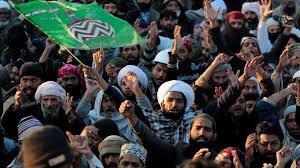
Extremists in Pakistan have been emboldened by the Taliban’s success in Afghanistan
November 14, 20218:05 AM ET
DANIELLE KURTZLEBEN, BYLINE: The Taliban takeover of Afghanistan has had a knock-on effect in Pakistan. Attacks by a group known as the Pakistani Taliban are on the rise. Last week, the government signed a one-month cease-fire with the group. But as NPR’s John Ruwitch explains, the Pakistani Taliban and other groups are emboldened by the success of its ideological twin in Afghanistan.
JOHN RUWITCH, BYLINE: Tehrik-i-Taliban Pakistan, or TTP for short, has been around since 2007. And for a time, it wreaked havoc, killing tens of thousands in suicide bombings and shootings in its quest to establish Sharia law in Pakistan. The violence culminated in this horrific scene at a school in December 2014.
RUWITCH: The attack, heard here in a news report from Pakistan’s SAMAA TV, left around 150 people dead. Most were children. It hardened the Pakistani government’s resolve to go after the TTP, says Madiha Afzal, an expert on extremism in Pakistan at the Brookings Institution.
MADIHA AFZAL: Once the Pakistani military decided to take action against it, it was able to, to a great degree, at least drive it out of the tribal areas.
RUWITCH: Over the next few years, she says, the number of attacks fell, but the TTP was not gone. Its foot soldiers and commanders had melted away or slipped across the notoriously porous border.
AFZAL: Many of them, turns out, were in prison in Afghanistan.
RUWITCH: When the Afghan Taliban seized power in August, it freed thousands of prisoners, including senior members of the TTP. Mohsin Dawar represents North Waziristan in Pakistan’s parliament. It’s in the tribal areas bordering Afghanistan and has seen a number of attacks by the TTP in recent weeks.
MOHSIN DAWAR: So they are back with more strength, and they are regrouping. They have got immense ideological and moral strength after the collapse of Kabul.
RUWITCH: According to the Pakistan Institute for Peace Studies, there have been more than a hundred attacks nationwide this year by the TTP. More than half have happened since the start of July. Mohsin Dawar says this is what blowback looks like. Years of support from the Pakistani government for militant groups in Afghanistan was bound to spill back over the border.
DAWAR: The policymakers of Pakistan, specifically the military general – they have brought the country to the point from where I think it is almost impossible to retreat.
RUWITCH: Javed Ashraf Qazi is more optimistic. He once ran Pakistan’s powerful military intelligence agency. It played a key role in creating and supporting the Afghan Taliban. He thinks the uptick in attacks is not particularly worrisome yet. The army is hitting the TTP where they operate here, and the Afghan Taliban will eventually go after those taking refuge across the border, he says.
JAVED ASHRAF QAZI: We have told the Taliban that our friendship will depend on your not allowing TTP any action in Pakistan. And they promise that they will take care of it.
RUWITCH: That may be wishful thinking, but even so, it’s not just a question of tackling violent extremists. Abdul Majeed Hazarvi (ph) is the local emir of the Assembly of Islamic Clerics, a religious political party. He says when the Taliban took over in Afghanistan, people he knows said special prayers of thanks. And some handed out sweets.
ABDUL MAJEED HAZARVI: (Through interpreter) Naturally, it is a happy moment because we are a religious party, and we are struggling to establish the law of Allah in Pakistan.
RUWITCH: Armed struggle is not the answer in Pakistan, he says. But anyone who is religious should be happy about the Afghan Taliban’s victory. His party and other right-wing religious parties who have traditionally fared poorly in elections are gaining attention and traction. That’s concerning, says Amir Rana, a security analyst at the Pakistan Institute for Peace Studies.
AMIR RANA: In my view, biggest challenge is extremism.
RUWITCH: The Taliban victory emboldens religious hardliners across the board, and the government doesn’t have its eye on the ball, he says.
RANA: Pakistan focus is always remain on countering terrorism. And they pay less attention on countering extremism. And this is, in my view, going to create a big challenge for Pakistan in coming months and years.
RUWITCH: He thinks far-right religious parties may make fresh gains in upcoming elections, and that could eventually lead to stricter religious regulations in Pakistan – a nuclear armed republic that’s nominally Islamic but has strong secular traditions. Even if the religious parties don’t make big gains, Rana says they’ll still be in a much better position to pile pressure on the authorities. John Ruwitch, NPR News, Islamabad.
Copyright © 2021 NPR. All rights reserved. Visit our website terms of use and permissionspages at www.npr.org for further information.
NPR transcripts are created on a rush deadline by Verb8tm, Inc., an NPR contractor, and produced using a proprietary transcription process developed with NPR. This text may not be in its final form and may be updated or revised in the future. Accuracy and availability may vary. The authoritative record of NPR’s programming is the audio record.
No comments:
Post a Comment